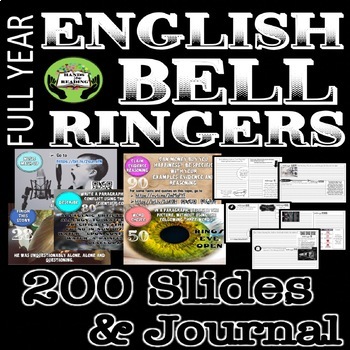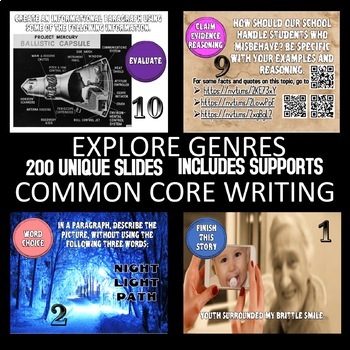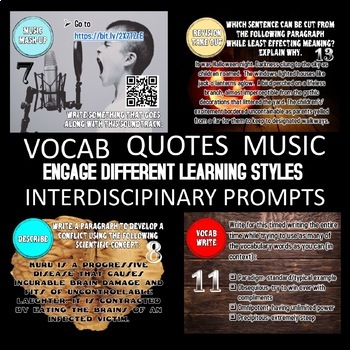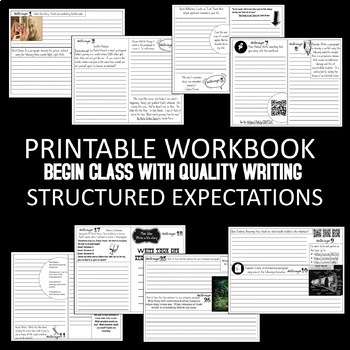BELL RINGERS FOR ENGLISH | DIGITAL & PRINT DAILY WRITING PROMPTS | DISTANCE
- PDF
What educators are saying
Description
Complete with a printable student workbook, these bell ringers are sure to engage your students in unique quality writing. Give students a lot of variety and practice with the writing process, interdisciplinary writing, and multiple genres by including this resource in your daily practices.
This product includes 180 slides and the accompanied workbook for one entire school year of daily writing, but it is versatile enough to work whenever you need in your curriculum. In addition, I have included 20 additional filler Bell Ringers, in case one of the 180 doesn’t suit your needs or you require additional ones.
With mentor text examples from high interest young adult literature, these Bell Ringers also promote reading and the revision process.
The prompts are organized in the following categories:
- Conflict Analysis: Reflect on the conflict in a young adult novel. Determine what you would do.
- Finish this story: Expand on the given prompt sentence and picture.
- Word Choice: Create a descriptive paragraph without using common word choice.
- Revision Add-In: Change, add, or revise words in a paragraph from a high interest published young adult novel.
- Quote Reflection: Apply the wisdom of a famous quote in your own life.
- Mentor Sentence Mimic: Dissect a published author’s sentence and create your own mimic sentences.
- Music Mash-Up: Use genre music to create your own writing.
- Describe: Make a paragraph that extends on a given description.
- Claim, Evidence, Reasoning: Write an argumentative paragraph on a student relevant topic with supplied information.
- Evaluate: Examine an infographic to create an informational paragraph.
- Vocabulary Write: Include the given academic words in your own timed writing.
- What would you do?: Explain your reaction to a situation.
- Revision Take-Out: Decide the least effective sentence in a paragraph.
- Tell this Story: Use the picture to create a writing. A helper sentence is included.
- History Extension: Use historical writings or facts to create historical fiction.
- Main Idea: Expand on a given main idea.
- Point of View: Using the same picture/situation, develop two paragraphs: one from a protagonist perspective and one from an antagonist point of view.
Are you interested in this resource, but would like to sample some quality sample slides in the class room? If so, check out the first 10 slides of this resource:
FREEBIE BELLRINGERS: 2 WEEKS OF WRITING
Need more distance learning resources?
Informational Text Features Escape Room
Flowers for Algernon Escape Room





